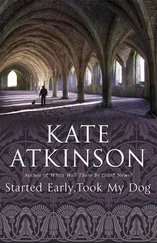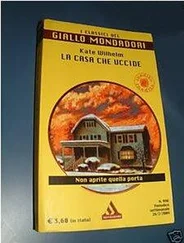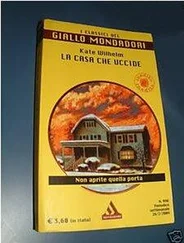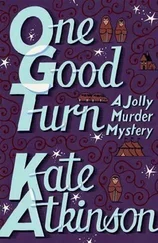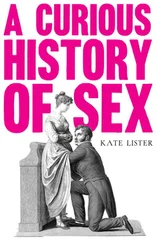Caroline had driven past the church several times, but it had never struck her until now that she could actually go inside. She knew the vicar, of course, or at least, she had known him: he died last year and his replacement hadn't arrived yet. The new incumbent wouldn't have just the two churches to look after: there were four or five denuded parishes under his care nowadays (or perhaps it would be a woman?) because no one went to church anymore, not even Jonathan's mother.
It had nothing to do with religion – Caroline was just sheltering from the rain. She'd taken the dogs for a walk, the church was about a mile from their own house (which was an estate, really), and the dogs had got into the graveyard and were now moving like Hoovers across the ground, their noses down, their tails up, their small dog brains consumed with the idea of uncharted territory and a thousand new scents. Caroline could only smell the one scent – the sour, melancholy smell of greenery.
The dogs had already urinated on several gravestones and Caroline hoped no one was spying on her. Watching, not spying. "God, you're so paranoid, Caro," Jonathan said. "That's what comes from being a townie." The dogs were Labradors and they belonged to Jonathan. That's what he brought to the marriage, two dogs and two children. James and Hannah, Meg and Bruce. Meg and Bruce were the dogs. The dogs and the children behaved well for Jonathan, less well for Caroline, although the dogs were better than the children. When it had started to rain she tied the dogs up on the porch (it would be good if she could do that with the children). She hadn't realized that "Caro" was a diminutive of Caroline until she met Jonathan. It sounded very Regency, like in all those old-fashioned historical novels she used to read when she was younger. Much younger. Of course, he came from the kind of background – county – where people were called "Caroline." And Lucy, and Amanda and Jemima, so he should know.
She suspected there might be a special ecclesiastical word for "porch," but if there was she didn't know it, although she knew there were all kinds of particular terms for the bones of the church, its carcass and ribs, like medieval poetry – apse, chancel, nave, transept, clerestory, sacristy, misericord – although she wasn't too sure what any of them meant, except for "misericord," because it was one of those words that once you'd come across it you always remembered it.
The misericords in St. Anne's were ancient, made of oak, not the oak of the church door, which was gray and bleached like old driftwood, as if it had been at sea for a long time, the misericords were the color of peat or wet tea leaves. If you looked at them closely you realized they were carved with weird, pagan creatures, more like hobgoblins than men, half hidden among trees and leaves – here acanthus and there what looked like a palm tree. This must be the "green man," only there were lots of them on the ends of the pews – all different – so green men would have been more appropriate. She didn't know they had green men in Yorkshire as well. As well as where she had lived before. In another life, one she could hardly remember sometimes. And at other times remember only too well.
She loved that word, "misericord," because it sounded so wretched and yet it wasn't. It meant tenderhearted, from the Latin for heart, "cor," from which you also get "core" and "cordial" but not "cardiac," which came via the Latin from the Greek for heart – "kardia" (although they must surely be related at some ancient, ur-level). They had done neither Latin nor Greek at Caroline's school, but later, after she had left school, when she had had a lot of time on her hands, she had patiently worked her way through primers and elementary Classics textbooks so that she could at least understand the etymology of words, to follow them back down their limbs and trunks until she reached their roots. Her own name contained "cor" if you moved the letters around. Caro. Cora. Cor. Like the crows, like the crows that feed on the dead. If you knelt on the hard floor, which in this church meant you couldn't avoid kneeling on the cold stone slab of someone's tomb "but they were probably glad of the company), and looked one of the green men in the eye, you could see the primordial gleam of madness in there and the –
"Are you all right?"
"Yes," Caroline said. "I think so." The man offered his hand because her knees were stiff from kneeling on the floor, on the dead. The man's hand was soft and rather cold for someone who was patently alive.
"My name's John Burton," he said (cordially).
"You're very young," Caroline said. "Or is that a sign I'm getting old – when vicars and policemen begin to look young?" and the vicar (John Burton) laughed and said, "My mother always says it's when bishops start looking young that you have to worry," and Caroline wondered what it was like to inhabit so easily a world where your mother made jokes about bishops, where people were called Caro.
"You'll be the new vicar then," Caroline said. He was wearing his cassock (was that what it was called?) so it was hardly a wild guess, and he looked down at his vestments and gave a rueful grin and said, "You've got me bang to rights, guv," only he sounded faintly ludicrous because he said the words in his rather effete, upper-crust voice. Jonathan had retained (or acquired) a rough limestone edge to his voice that made him seem no-nonsense and forceful. "Very Heathcliffe," her friend Gillian had said sarcastically, because, of course, he was moneyed and (very) expensively educated and his mother spoke like the Queen.
"I know who you are too," John Burton said, and Caroline said, "Do you?" and thought, "Are we flirting? Surely not," and John Burton – the Reverend John Burton – said, "Yes, of course I do. You're the head teacher at the primary school," and Caroline thought, "Damn," because she really preferred it when no one knew who she was. No one at all.
Gretting married again hadn't been part of the plan. The plan had been to bury herself in a town somewhere and do good works, like an eighteenth-century Quaker or some Victorian gentlewoman driven by philanthropy. She'd even thought about going abroad – India or Africa – like a missionary, working on a literacy project with women or outcastes, because being an outcast was something she understood.
She came north, expecting it to be gritty and industrial, but she knew that it was the novels she had read that had formed this picture in her head, and, of course, instead of being like North and South or Saturday Night and Sunday Morning, it was gritty and post-industrial and so much more difficult than she'd imagined. She'd spent her probationary year in Liverpool, then she did another couple years in Oldham and finally settled in Manchester. She was a "superteacher," although they didn't call it that, trained to be the savior of socially excluded kids, fast-tracking through inner-city Gehennas so that one day she was destined to be head of some imploding school that she would have to try and rescue from disaster, like the captain of a sinking ship. And that was fine and good because she was atoning, but instead of joining a convent, an order of penitents (an idea she'd been tempted by), she'd become a teacher, which was probably more useful than shutting yourself away, praying every four hours, night and day, although, of course, you couldn't be sure – it might be that cloistered women praying night and day was the only thing that was preventing some cataclysmal disaster – a meteor or global nuclear meltdown.
So, her life had been moving forward according to this plan. She lived in a small flat, one bedroom, walls painted white, scented candles, everything kept simple (very like a secular anchorite in fact) and socialized minimally with the other staff. There were a couple of middle-aged divorcees that she sometimes went to the cinema with or with whom she shared a bottle of wine, someplace where it was quiet enough to talk. The conversation generally bemoaned the lack of suitable men – "all the good ones married or gay" – the usual stuff, and when they poked around in her own life she said, "One bad marriage is enough" in a way that suggested it had been too bad to talk about. She was taking a break from relationships, she said, only she didn't say how long that break had been. Twenty-two years since she'd been with a man! The middle-aged divorcees would be astonished if they knew that. But then, celibacy was a part of being an anchorite, wasn't it? Or was it anchoress? The Reverend Burton would know ("Call me John, for God's sake." He laughed). Of course, she'd had sex with women in that time, so you couldn't really call it celibacy.
Читать дальше
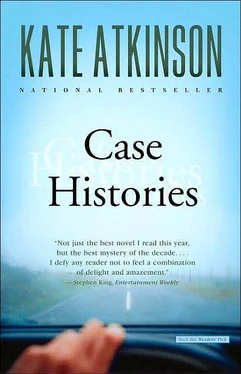
![Дорис Лессинг - Заметки к истории болезни [Notes for a Case History ru/en]](/books/232730/doris-lessing-zametki-k-istorii-bolezni-notes-for-thumb.webp)

